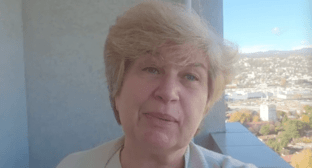12 May 2004, 16:27
Svetlana Gannushkina convinced any Chechen can be given refugee status rightfully
Below is the full text of a statement by Svetlana Gannushkina, chair of the Civic Assistance committee for refugees, head of the Migration and Law Network of the Memorial Human Rights Center and a member of the Commission on Human Rights for the Russian President:
I was deeply resentful to learn that my name and the name of the organizations I am with are used to confirm the possibility to deport Chechnya residents applying for asylum in other countries to Russia.
I am convinced that any Chechen person arriving from Russia can be given a refugee status rightfully in accordance with the definition in the 1951 UN Convention relating to the Status of Refugees (with the only exception of the Akkii Chechens living in Dagestan and making up a special group). Since 1994, I have collected vast evidence proving the right of Chechnya residents to asylum, and, after documenting them, forwarded to various nations' migration authorities and NGOs or handed to people looking for asylum. This is a part of my daily work which seems very important to me because it can deliver people from severe sufferings and real threat of death.
Every year we make up reports on the condition of Chechnya residents inside and outside the republic. Such a report is being prepared this year, too. There are no reasons to maintain that the situation has changed and Chechnya residents restored to Russia are guaranteed safety. The bombing of Rigakhoi on April 8 killing the Dadaev family - the mother and her five small children - proves this as obviously as possible. This is not an only case: we have registered in 2004 dozens of detainees disappearing, their dead bodies with traces of torture occasionally uncovered by local residents.
Unwilling to undertake responsibility for what is going on in Chechnya, competent agencies in some western countries distort information they receive from Memorial, and from me in particular. In response to some inquiries, I answered I did not know a case when a Chechen person was persecuted exactly for having been to a foreign state, asking for asylum and deported to Russia. (However, I never said there were no such cases.)
This does not mean that, coming back, a Chechnya resident will be able to find a place where they will be registered and where they will be able to live in peace, because there is no such place for Chechens in Russia. Our reports give detailed accounts of this, and another one will be given this year. To be registered in the Russian regions, one has to have a place where the masters will give their consent to this. However, police "warns against" or just threatens masters. Therefore, there are almost no such people. Only close relatives and friends are ready to receive Chechens, but their apartments have long been overcrowded.
There are places where Chechnya residents are persecuted to a smaller extent (Saratov, Nizhny Novgorod) and where it is simply impossible to live (Krasnodar territory, for example). There are serious troubles everywhere, though. Besides, the practice of tough special operations, abductions and illegal detentions of people has spread to Ingushetia in 2003, the only region that had received Chechens.
It should be taken into account that getting to Europe is extremely difficult and obtaining a visa is expensive and impossible without a bribe (even our worker Lydia Yusupova, a Martin Ennals Award winner, had big trouble with getting out to Europe). Therefore, deported Chechens do not have a farthing in their pockets when they are back in Russia again.
Of course, the Memorial Human Rights Center does not consider deportation acceptable. We are doing what we can to make western officials hear us. Yet they hear what they want to. Our information is called statistically inadequate, while we are accused of not mentioning thousands remaining alive when we speak about hundreds dying. However, even statistics show that the number of civilians dying in Chechnya is similar to the number of Soviet people dying during Stalin's big terror. All this can be found on Memorial's website at www.memo.ru.
Western authorities' attitude makes some refugees invent stories about arrests and torture that deported people experienced after deportation. People lie in the hope to come back and obtain asylum, because the terrible truth seems insufficiently convincing. Occasionally, western NGOs support this version seeking to achieve a ban on deportations in the easiest way possible.
If all Chechens coming back to Russia from Europe were threatened with special danger, which alone would make their deportation impossible, our common work would be easier. That is not so, but what is much more important is that all of Chechnya's residents need protection currently, because they are facing a real threat of death in their homeland, while their living conditions are unbearable. If it is impossible to stop the slaughter in Chechnya, those few getting out of it have the right to be given asylum in any state party to the 1951 UN Convention relating to the Status of Refugees."
Source: Civic Assistance committee for refugees




